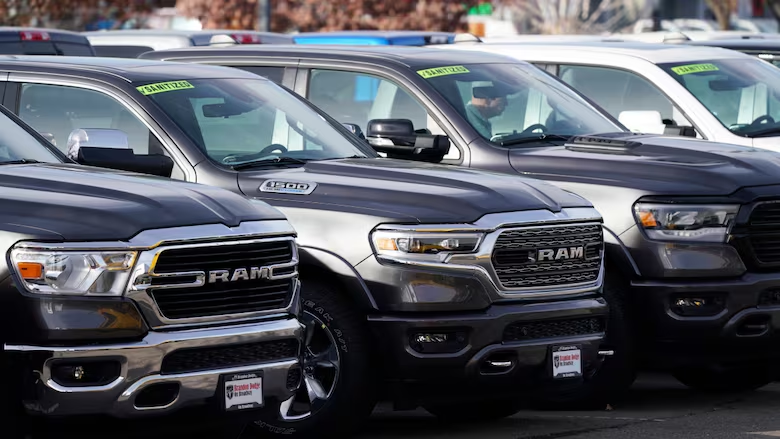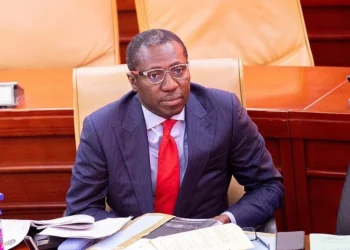In a significant escalation of its fight against stolen vehicles, the Ghana Police Service’s Criminal Investigations Department (CID) has launched a special task force dedicated to impounding illicitly imported vehicles.
This initiative forms part of renewed efforts to dismantle transnational car theft networks that have increasingly turned Ghana into a destination for illegally acquired vehicles.
The Director-General of the CID, Deputy Commissioner of Police (DCOP) Lydia Yaako Donkor, disclosed at a press conference on August 4 that the new task force will engage in intelligence-driven operations aimed at tracking and seizing suspected stolen vehicles.
The unit has already impounded six vehicles believed to have been stolen from Canada, including four Toyotas, one Toyota RAV4, and a Range Rover.
Ongoing investigations suggest the vehicles were taken using fake identities to rent them from agencies abroad. The vehicles are then shipped to Ghana while the original rental agreements remain active.
According to DCOP Donkor, these transnational networks have grown increasingly sophisticated, carefully selecting vehicle models and modifying appearances to obscure their origin.
She noted that “the sophistication of these syndicates, particularly their branding and model choices, suggests a deliberate effort to disguise the vehicles’ origins.”
CID officials are urging vehicle importers, dealers, and buyers in Ghana to conduct thorough checks before registering or purchasing any vehicles.

The warning is clear: failing to verify the origins of a vehicle could lead to legal consequences, as ownership of stolen vehicles cannot be legitimized through customs payments alone.
In addition to the recent seizures, the CID has made notable progress this year in tackling international vehicle theft. Between January and July 2025, a total of 43 luxury vehicles stolen abroad and brought into Ghana were recovered.
The list of recovered cars includes high-end brands such as Rolls-Royce, Audi, Porsche, BMW, and Mercedes-Benz. These vehicles were traced back to thefts in countries including Canada, the United States, Germany, France, Belgium, Spain, the Netherlands, and Italy.
Luxury Cars Recovered, Syndicates Exposed
The CID’s operations have revealed that these criminal networks are part of broader organized crime syndicates, often linked to other illegal activities such as money laundering, visa fraud, insurance scams, and identity theft.
Authorities believe that Ghana has inadvertently become a node in these global supply chains for illicit goods.
DCOP Donkor credited the success of recent operations to strengthened collaboration with both local and international agencies.
“The administration has stepped up efforts to fight vehicle crime by working in close collaboration with other national agencies, including the Customs Division of the Ghana Revenue Authority, and international partners like INTERPOL and the FBI.”
DCOP Lydia Yaako Donkor
These partnerships facilitate intelligence sharing, allowing the CID to track suspicious shipments and identify connections to global car theft syndicates.

She explained that this coordination supports investigations into “transnational organized criminal groups involved in the stolen motor vehicle trade.”
She cited recent INTERPOL-led operations like Operation Safe Wheels, which spanned twelve West African countries in late 2024 and early 2025.
That campaign alone led to the identification of over 150 stolen vehicles, many of which had been shipped to Ghana from Europe and Canada. The pattern underscores the need for sustained vigilance and international cooperation.
Of the 43 vehicles seized by the CID this year, investigations have been concluded for 18. Ghanaian courts have issued repatriation orders for these, and eight have already been returned to their countries of origin.
Ten others are awaiting final documentation, while cases involving the remaining 25 are still under judicial review.
Importers Fail To Prove Ownership Of Stolen Vehicle
DCOP Lydia Yaako Donkor further emphasized that every impounded vehicle undergoes a comprehensive investigative process.
Importers are given a fair chance to present valid documentation proving ownership or legal purchase from the vehicle’s country of origin.
“It is sad to note that in almost all the cases mentioned above, those who clear the vehicles in Ghana are unable to provide proof of ownership or purchase of the vehicles from the country of origin prior to their importation into Ghana.”
DCOP Lydia Yaako Donkor

This trend points to a concerning level of negligence—or in some cases, direct complicity—on the part of importers operating within Ghana. “Let me indicate here that payment of customs duties in Ghana does not mean that the vehicle was legitimately acquired from the country of origin.”
The CID is now calling on members of the public, especially those involved in vehicle trading, to conduct comprehensive checks using available verification platforms.
This step is necessary to prevent the circulation of stolen vehicles within the local market and to reduce the risk of legal and financial repercussions.
Beyond local enforcement, the CID’s operation sends a broader message to international criminal syndicates: Ghana is stepping up its game.
Through strategic partnerships, forensic investigations, and a clear public communication strategy, the police aim to break the grip of transnational vehicle theft rings on the country’s import system.
The broader challenge, however, remains the sophistication of the syndicates. These networks routinely alter Vehicle Identification Numbers (VINs) and falsify documents to evade detection. Some even manipulate digital registries or pay for forged customs stamps to give an appearance of legitimacy.
As vehicle crime becomes more global and more tech-driven, the CID’s ongoing operations are an important test of Ghana’s institutional ability to adapt and respond.
Their approach—based on intelligence, legal process, and international collaboration—will likely serve as a model for addressing other transnational crimes in the future.
READ ALSO: MIIF Partners Korle-Bu to Roll Out Free Medical Outreach in Mining Communities























